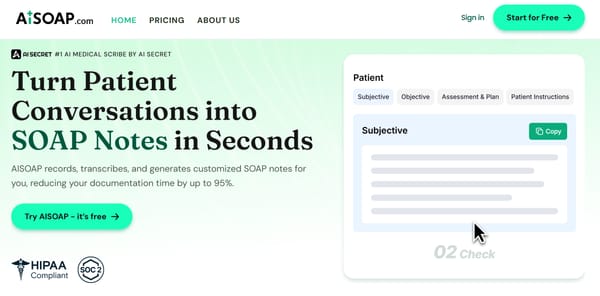10 Best Legal AI Tools for Legal Professionals in 2024

In the rapidly evolving landscape of legal practice, artificial intelligence (AI) has emerged as a transformative force, reshaping how legal professionals operate. As of 2024, AI tools have become indispensable assets for law firms and individual practitioners, offering unprecedented opportunities to enhance efficiency, accuracy, and client service. This report delves into the top 10 AI tools that are revolutionizing the legal industry, providing insights into their capabilities and the benefits they bring to modern legal practice.
The integration of AI in legal workflows is not merely a trend but a necessity for staying competitive in a field characterized by increasing complexity and demand. AI tools are designed to automate routine tasks, such as document review and contract management, allowing lawyers to focus on strategic decision-making and client engagement. These tools leverage advanced technologies like machine learning and natural language processing to deliver sophisticated insights and streamline operations.
Among the leading AI tools, platforms like LegalRobot and LawGeex stand out for their ability to automate document analysis and contract drafting, significantly reducing the time and effort required for these tasks. Similarly, ClickUp offers a comprehensive productivity platform that centralizes legal work, enhancing collaboration and task management.
The adoption of AI in the legal sector has been driven by its potential to improve productivity and client satisfaction. According to industry reports, a significant percentage of law firms are already leveraging AI tools to optimize their operations, with many more recognizing the potential for AI to reduce workloads and enhance service delivery. As these technologies continue to evolve, they promise to further transform the legal profession, making it more agile and responsive to the needs of clients.
In this report, we will explore the top 10 AI tools that are setting new standards in legal practice for 2024. Each tool is evaluated based on its integration capabilities, user-friendliness, and the tangible benefits it offers to legal professionals. By understanding these tools, law firms can strategically adopt AI solutions that align with their goals, ensuring they remain at the forefront of the legal industry's digital transformation.
You can also visit Oncely.com to find more Top Trending AI Tools. Oncely partners with software developers and companies to present exclusive deals on their products. One unique aspect of Oncely is its “Lifetime Access” feature, where customers can purchase a product once and gain ongoing access to it without any recurring fees. Oncely also provides a 60-day money-back guarantee on most purchases, allowing customers to try out the products and services risk-free.
Oncely are hunting for the most fantastic AI & Software lifetime deals like the ones below or their alternatives:

Table of Contents
- Key Features of Legal AI Tools in 2024
- Advanced Legal Research Capabilities
- Document Drafting and Review Automation
- Workflow Optimization and Project Management
- Predictive Analytics and Strategic Planning
- Customization and Integration with Existing Workflows
- Benefits and Challenges of Implementing Legal AI
- Enhanced Efficiency and Productivity
- Improved Accuracy and Decision-Making
- Cost Reduction and Resource Optimization
- Challenges of AI Hallucinations and Data Security
- Ethical and Professional Considerations
- Overcoming Resistance to Change
- Top Legal AI Tools for Enhancing Legal Practice
- Briefpoint.ai: Revolutionizing Document Drafting
- Genie AI: Streamlining Contract Drafting
- ContractSafe: Enterprise-Level Contract Management
- Everlaw: Excellence in E-Discovery
- Taskade AI: Collaborative Document Drafting
- Ghostwriter Legal: Enhancing Writing Quality
- Latch: Advanced Contract Analysis
- Casetext: Cost-Effective Legal Research
- Law ChatGPT: Accessible Document Creation
- LegalRobot: Simplifying Document Analysis
Key Features of Legal AI Tools in 2024
Advanced Legal Research Capabilities
Legal AI tools in 2024 have significantly enhanced the way legal professionals conduct research. These tools provide access to extensive databases, including case law, statutes, regulations, and legal opinions, ensuring comprehensive research capabilities. For instance, platforms like Bloomberg Law offer unmetered access to primary and secondary sources, which is crucial for thorough legal research. AI-powered search functionalities allow users to perform precise and efficient searches, with algorithms capable of understanding natural language queries. This advancement makes it easier for lawyers to find relevant information quickly, thereby saving time and improving the accuracy of legal research.
Document Drafting and Review Automation
Automation of document drafting and review is a standout feature of legal AI tools in 2024. Tools like LegalRobot and Spellbook AI utilize advanced machine learning to simplify and improve the understanding of complex legal documents. LegalRobot, for example, automates contract drafting, helping lawyers create accurate and compliant documents swiftly. Spellbook AI, integrated with Microsoft Word, enhances the drafting process by providing suggestions and automations that align with legal standards. These tools break down legal jargon and present information clearly, making the contract review process more efficient and reducing the likelihood of human error.
Workflow Optimization and Project Management
Legal AI tools are increasingly focusing on optimizing workflows and project management within legal practices. Platforms like ClickUp offer all-in-one productivity solutions that help legal professionals centralize their work into dynamic workspaces. With customizable views such as List, Calendar, and Table, users can visualize their caseload from every angle. Additionally, tools like CSDisco are known for eDiscovery, helping manage large volumes of electronic data by categorizing documents and removing duplicates. This streamlining of project management processes saves time and effort, allowing legal professionals to focus on strategic tasks.
Predictive Analytics and Strategic Planning
AI tools in the legal sector are now equipped with predictive analytics capabilities that aid in strategic planning. Tools like Blue J Legal use AI models to predict case outcomes based on historical data, providing lawyers with strategic insights. These tools analyze trends and patterns, helping legal professionals make informed decisions and assess potential risks. By leveraging AI insights, lawyers can develop more effective case strategies, improving their chances of success. This data-driven approach not only enhances the quality of legal services but also provides a competitive advantage in case strategies.
Customization and Integration with Existing Workflows
Customization and seamless integration with existing workflows are critical features of legal AI tools in 2024. Many tools offer customizable features that allow lawyers to tailor them to their specific needs and preferences. For example, Layerup provides an all-in-one suite of legal AI assistants for in-house counsels and legal teams, offering more customization options. Additionally, tools like Clio integrate a wide range of external websites and services, enhancing their functionality and ease of use. This integration ensures that AI tools complement and strengthen existing processes, increasing time savings and reducing costs simultaneously.
In summary, the key features of legal AI tools in 2024—advanced legal research capabilities, document drafting and review automation, workflow optimization, predictive analytics, and customization—are transforming the legal industry. These tools enhance efficiency, accuracy, and productivity, making them indispensable assets for modern legal practices.
Benefits and Challenges of Implementing Legal AI
Enhanced Efficiency and Productivity
Implementing AI tools in legal practice significantly enhances efficiency and productivity. AI tools automate repetitive tasks such as document review, contract analysis, and legal research, allowing legal professionals to focus on more strategic and complex tasks. For instance, tools like LegalRobot automate contract drafting and document analysis, reducing the time lawyers spend on these tasks and minimizing human error. This automation not only speeds up the process but also improves the accuracy of legal documents, which is crucial in maintaining compliance and avoiding potential legal pitfalls.
AI tools also streamline case management and workflow optimization. Platforms like ClickUp offer customizable views and dashboards that help legal professionals manage their caseloads more effectively. By centralizing tasks and providing real-time analytics, these tools enable lawyers to maintain a high-level overview of their work, ensuring that nothing falls through the cracks.
Improved Accuracy and Decision-Making
AI tools enhance the accuracy of legal work by providing precise legal research and analysis. For example, ROSS Intelligence uses AI to deliver relevant case law citations and precise answers, which aids lawyers in making informed decisions. This level of accuracy is particularly beneficial in complex legal cases where the margin for error is minimal.
Moreover, AI tools like Humata AI specialize in document analysis and data extraction, quickly generating legal insights. This capability allows lawyers to retrieve information efficiently, supporting better decision-making processes. By leveraging AI's ability to process vast amounts of data, legal professionals can uncover valuable insights that might otherwise be missed, enhancing their strategic value to clients.
Cost Reduction and Resource Optimization
The implementation of AI tools in legal practice can lead to significant cost savings. By automating routine tasks, law firms can reduce the need for extensive human resources dedicated to these activities. A Deloitte study predicts that AI could automate around 100,000 legal roles by 2036, resulting in substantial cost reductions for the industry. This shift allows firms to allocate resources more effectively, focusing on areas that require human expertise and judgment.
Additionally, AI tools can help law firms save money on expensive legal research databases. Tools like Jasper.ai use natural language processing to analyze legal documents and provide relevant case law, statutes, and regulations, enabling lawyers to conduct research more efficiently and cost-effectively.
Challenges of AI Hallucinations and Data Security
Despite the numerous benefits, implementing AI in legal practice comes with challenges, particularly concerning AI hallucinations and data security. AI hallucinations refer to instances where AI generates outputs that sound plausible but are entirely fabricated. This issue is prevalent in large language models like ChatGPT, which predict the most probable next word in a sentence. In the legal context, such hallucinations can lead to the creation of non-existent cases or opinions, posing significant risks to legal accuracy and reliability (Harvard Law Review).
To mitigate these risks, law firms must implement robust human oversight and validation processes. Ensuring that AI-generated content is reviewed by experienced legal professionals can help prevent the dissemination of inaccurate information. Additionally, firms should choose AI tools that are specifically designed for legal work, as these are more likely to incorporate safeguards against hallucinations.
Data security is another critical concern when implementing AI in legal practice. Legal professionals handle sensitive information, and maintaining data integrity and security is paramount. AI systems must be equipped with strong data protection measures to prevent unauthorized access and ensure compliance with regulatory standards (Tucan.ai).
Ethical and Professional Considerations
The integration of AI tools in legal practice also raises ethical and professional considerations. Ensuring regulatory compliance, safeguarding client confidentiality, and maintaining transparency are essential when using AI tools. Legal professionals must evaluate the accuracy, fairness, and potential bias of AI algorithms to ensure that they do not compromise human judgment or the attorney-client relationship (Grow Law Firm).
Moreover, there is a concern about the potential displacement of legal jobs due to AI automation. While AI can automate certain tasks, the complexities of law and the need for human judgment make it unlikely for AI to fully replace lawyers. Instead, AI should be viewed as a tool that complements human expertise, allowing lawyers to focus on higher-level strategic work and client interaction.
Overcoming Resistance to Change
Resistance to change is a common challenge in the adoption of AI tools in legal practice. Legal professionals may fear job displacement or be hesitant to adopt new technologies due to a lack of familiarity or understanding. To overcome this resistance, law firms should invest in training and education programs that demonstrate the benefits of AI tools and how they can enhance legal work (Tucan.ai).
Additionally, involving legal professionals in the selection and implementation process of AI tools can help address concerns and ensure that the tools meet the specific needs of the firm. By fostering a culture of innovation and openness to new technologies, law firms can successfully integrate AI tools into their practice and harness their full potential.
Top Legal AI Tools for Enhancing Legal Practice
Briefpoint.ai: Revolutionizing Document Drafting
Briefpoint.ai is a standout tool in the realm of legal AI, primarily due to its ability to significantly reduce document drafting time. The platform's intelligent algorithms are designed to understand legal context and generate appropriate responses, which is particularly beneficial for litigation practices. By cutting down drafting time by up to three hours per document, Briefpoint.ai enhances productivity and allows legal professionals to focus on more strategic tasks (Anakin AI).
Genie AI: Streamlining Contract Drafting
Genie AI excels in contract drafting, offering a comprehensive template library and intuitive clause analysis features. This tool is particularly valuable for firms that prioritize efficiency in contract creation. By providing a vast array of templates and facilitating easy clause analysis, Genie AI helps legal professionals draft contracts more quickly and accurately, thereby improving overall workflow efficiency (Anakin AI).
ContractSafe: Enterprise-Level Contract Management
ContractSafe is renowned for its enterprise-level contract management solutions. It offers robust security features and seamless e-signature integration, making it an ideal choice for large firms that require secure and efficient contract management. The tool's ability to manage contracts at scale while ensuring security and compliance is a significant advantage for enterprises looking to streamline their contract processes (Anakin AI).
Everlaw: Excellence in E-Discovery
Everlaw is a powerful tool for e-discovery and document review, making it invaluable for complex litigation cases and large-scale document analysis. Its technical capabilities allow for efficient handling of vast amounts of data, which is crucial in litigation scenarios where thorough document review is necessary. Everlaw's e-discovery excellence ensures that legal professionals can manage and analyze documents effectively, leading to better case outcomes (Anakin AI).
Taskade AI: Collaborative Document Drafting
Taskade AI offers a balance of features and affordability, making it suitable for small to medium-sized legal practices. Its collaborative features and accessibility allow legal teams to work together seamlessly on document drafting and other tasks. By facilitating collaboration and providing an affordable solution, Taskade AI helps smaller firms enhance their productivity and efficiency without significant financial investment (Anakin AI).
Ghostwriter Legal: Enhancing Writing Quality
Ghostwriter Legal focuses on maintaining writing quality while increasing productivity. This tool is particularly useful for legal professionals who need to produce high-quality written content efficiently. By providing writing assistance and productivity features, Ghostwriter Legal ensures that legal documents are not only well-written but also produced in a timely manner, which is essential in the fast-paced legal environment (Anakin AI).
Latch: Advanced Contract Analysis
Latch is known for its strength in contract analysis and risk management, making it a valuable tool for corporate legal departments. Its integration capabilities allow it to work seamlessly with existing systems, providing comprehensive contract analysis and risk assessment. By identifying potential issues and managing risks effectively, Latch helps corporate legal teams maintain compliance and mitigate legal risks (Anakin AI).
Casetext: Cost-Effective Legal Research
Casetext offers superior search capabilities and efficient document review features, making it a cost-effective alternative to traditional legal research tools. Its CARA AI feature allows users to upload legal documents and find related case law, statutes, and legal articles, thereby improving research efficiency and precision. Casetext's ability to streamline legal research processes helps legal professionals focus more on analysis and strategy (RunSensible).
Law ChatGPT: Accessible Document Creation
Law ChatGPT provides an accessible entry point for firms looking to explore AI-powered legal document creation. Its accessibility features make it easy for legal professionals to create documents efficiently, even if they are new to AI tools. By offering a user-friendly interface and powerful document creation capabilities, Law ChatGPT helps firms enhance their document management processes (Anakin AI).
LegalRobot: Simplifying Document Analysis
LegalRobot changes how law firms handle document analysis and contract drafting. Using advanced machine learning, it simplifies and improves the understanding of complex legal documents. LegalRobot automates contract drafting, helping lawyers create accurate and compliant documents quickly. By breaking down legal jargon and presenting information clearly, LegalRobot makes the contract review process easier and more efficient (RunSensible).
These tools represent the forefront of innovation in legal AI, offering a range of features that enhance efficiency, accuracy, and productivity in legal practice. By integrating these tools into their workflows, legal professionals can streamline their processes, reduce errors, and focus on higher-value tasks, ultimately delivering better service to their clients.
References
- https://golawhustle.com/ai-tools-for-legal-professionals/
- https://www.gartner.com/en/legal-compliance/topics/legal-technology
- https://clickup.com/blog/ai-tools-for-lawyers/
- https://www.superlegal.ai/blog/legal-technology-trends-in-2024/
- https://legaltechsociety.org/Blog/13324486
- https://thelegalpractice.com/tools/best-legal-writing-software/
- https://www.everlaw.com/blog/legal-technology/top-predictions-and-trends-for-legal-tech-in-2024/
- https://hls.harvard.edu/today/harvard-law-expert-explains-how-ai-may-transform-the-legal-profession-in-2024/
- http://anakin.ai/blog/what-is-the-best-ai-tool-for-writing-legal-documents/
- https://fortune.com/2024/10/22/luminance-ai-assistant-lawyers-legal/
- https://www.mycase.com/blog/ai/legal-ai-companies/
- https://www.runsensible.com/blog/legal-ai-tools/
- https://briefpoint.ai/legal-ai-tools/
- https://growlawfirm.com/blog/legal-ai-tools
- https://www.forbes.com/sites/joshuadupuy/2024/10/16/will-ai-replace-lawyers-openais-o1-and-the-evolving-legal-landscape/





